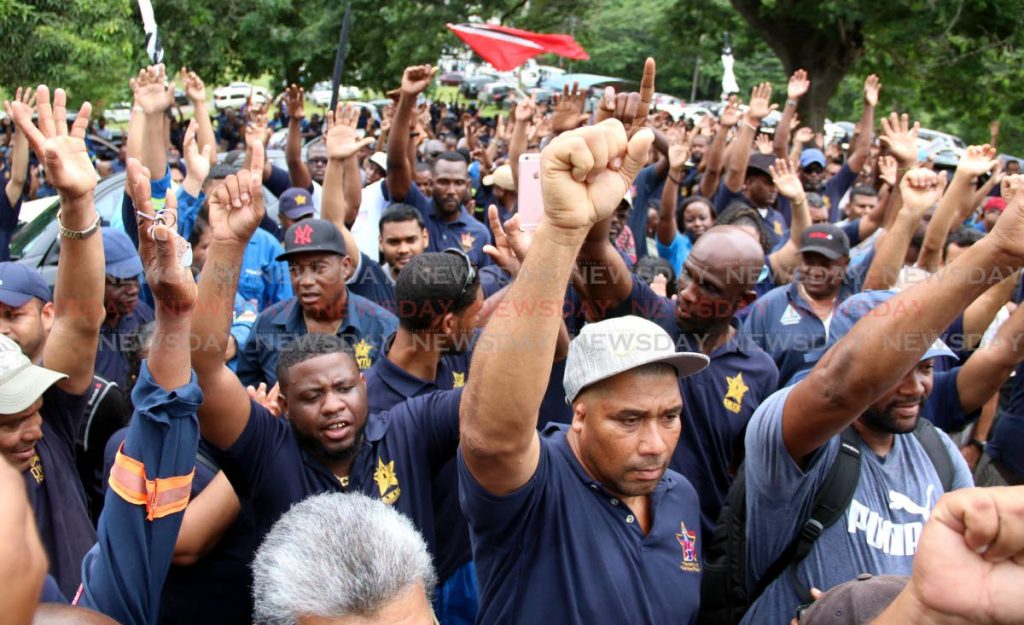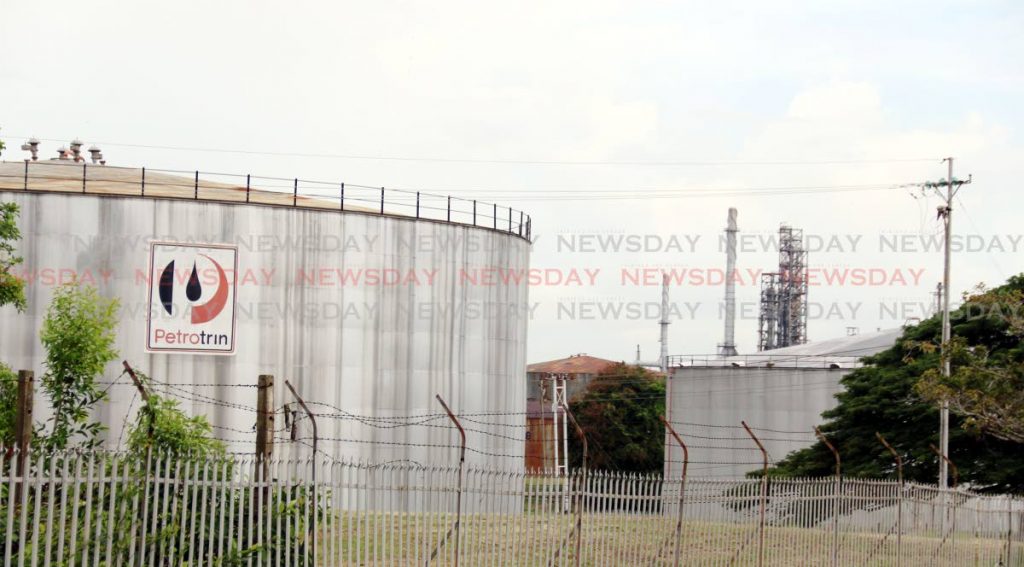Petrotrin gets go-ahead to fire workers

State-owned Petrotrin can now go ahead with plans to terminate its 5,000 employees by the end of next month, as the Industrial Court-imposed injunction has been stayed.
The application for the stay, ahead of Petrotrin’s appeal of the injunction, was heard yesterday by Justice of Appeal Charmaine Pemberton at a chamber court hearing at the Hall of Justice, Port of Spain. She delivered her ruling just after 11.30 pm, last night.
At a marathon session, Petrotrin’s lawyers, led by Reginald Armour, SC, sought to convince the judge that the stay was necessary since it is the company's contention that the Industrial Court made several errors in law when it granted the injunction on Monday.
A hearing of the appeal of the injunction is set for next week.
It is also the position of the State, represented by attorneys for the Attorney General, led by Seenath Jairam, SC, that the injunction is likely to have an adverse effect on public interest.
Permanent Secretary in the Ministry of Finance Vishnu Dhanpaul, in an affidavit in support of the stay, there are calls for government guarantees with great frequency.
He says as more delay and instability occur, as it has since the injunction was granted, he has received calls from financial institutions seeking reassurance from the State to protect their interests in Petrotrin.
“The danger of these increasing calls for guarantees is that it will adversely affect the national debt ratio, which is already more than optimum.
“The effect of any delay in the urgently needed restructuring of the assets and debts of Petrotrin, as is likely to be occasioned by the grant of injunctive relief, will only increase investor uncertainty and instability.
“This will result in inevitable calls upon Government for further guarantees and, if these are not forthcoming, will result in adverse creditors’ action.”
In its appeal, among the refinery’s contentions are that the Industrial Court had no jurisdiction to grant injunctive relief in an industrial relations complaint (IRO) or a matter which is criminal in nature, failed to consider the legal effect of its uncontested evidence of fundamentally changed circumstances on the applicability of the April 3 Memorandum of Agreement (MOU), and failed to distinguish between the closure of an employer’s operation with a restructuring plan.
It is also contending that the Industrial Court failed to fully consider the Attorney General’s evidence on the impact the continued operation of the refinery will have on the economy.
Petrotrin, which intends to close operations by no later than November 30, is relying on 15 grounds of appeal in all.
The company’s appeal was filed on Tuesday, 24 hours after the ruling was handed down by Industrial Court president Deborah Thomas-Felix and four other judges on an IRO filed by the Oilfield Workers Trade Union (OWTU), which is the majority union representing Petrotrin workers.
The union has argued that Petrotrin's board of directors acted in bad faith when it failed to meet with OWTU representative before meeting with the Cabinet, during which it was decided that it would be in the best interest of the people of Trinidad and Tobago to shut down the company.
The IRO hearing is set to take place on October 30, 31 and November 1.
In their ruling, the Industrial Court members all agreed Petrotrin was mandated to meet with union officials in accordance with the MOU.
President of the court, Deborah Thomas-Felix and the other members held that the injunction was needed to protect against the potential risk of injustice.
“It is our view that there would be a greater injustice if the issues affecting the loss of employment of 5,500 workers are not properly ventilated before the closure of the company,” Thomas-Felix said in the 16 page decision.
GROUNDS OF APPEAL
(a) The Industrial Court erred in law in granting injunctive relief when it had no jurisdiction to do so in an industrial relations complaint and/or a matter which is criminal in nature.
(b) The Industrial Court erred in law by failing to consider the legal effect of the Appellant's uncontested evidence of fundamentally changed circumstances on the applicability of the Memorandum of Agreement dated the 3rd April, 2018 between the parties entered as an order of the Court.
(c) The Industrial Court erred in law by conflating the closure of an employer's operations/business with a restructuring of an employer's operations/business and/ or failing to distinguish between same.
(d) The Industrial Court erred in law by conflating the obligation to meet, treat and enter into negotiations under section 40(1) of the Industrial Relations Act with the obligation to consult under section 5 of the Retrenchment and Severance Benefits Act, neither of which is applicable upon the closure of an employer's operations/ business.
(e) Having found that an employer has the right to close down its business/operations, the Industrial Court erred in law and/or exceeded its jurisdiction in finding that an employer is obligated to consult with the recognised majority union before deciding to close down its business/operations.
(f) The Industrial Court also erred in law and/or exceeded its jurisdiction by finding that an employer is obligated to consult with a recognised majority union before deciding to close down its business/operations in the absence of any legislative or other requirement to do so.
(g) The Industrial Court exceeded its jurisdiction when it breached the doctrine of separation of powers under the Constitution of Trinidad and Tobago by imposing an obligation on an employer to consult with a recognised majority union before deciding to close down its business/ operations, when Parliament has not seen it fit to impose any such obligation on employers.

(h) The Industrial Court exceeded its jurisdiction and/or erred in law in finding that there were serious issues to be tried in respect of an alleged breach of section 40(1) of the Industrial Relations Act when (i) section 40(1) of the Industrial Relations Act, on a proper construction, applies only to negotiations (not consultation) for the purposes of collective bargaining and (ii) the Industrial Court failed to follow its own precedents that there is a distinction to be drawn between negotiation and consultation, thereby rendering section 40(1) inapplicable.
(i) The Industrial Court also erred in law by failing to recognise that even if, which is denied, there was any duty to consult with the Union in relation to any decision to close down, the undisputed evidence before it was that: ( i) There was consultation with the Union at the relevant time; ( ii) That the Appellant, in any event, remained open to further input and/or considerations and/ or proposals and/or submissions from the Union (and took active steps to facilitate same); and ( iii) The Union, despite being afforded by the Appellant repeated opportunities for consultation and/or to submit proposals to the Appellant, failed to make and/ or offer any properly supported submissions and/or proposals in a timely manner or at all.
( j) The Industrial Court erred in law by failing to consider sufficiently or at all: ( i) All relevant factors in determining where the greater risk of injustice lies and/or, ( ii) the uncontested evidence of Wilfred Espinet and Vishnu Dhanpaul of the deleterious effects on the Appellant and the Government of Trinidad and Tobago respectively by the grant of the injunctions sought and/or, ( iii) the national interest and/or the community as a whole.
(k) The Industrial Court erred in law by finding that the balance of convenience, the justice of the case and the public interest were in favour of the grant of the injunction.
(l) The Industrial Court erred in law by failing to consider sufficiently or at all the adequacy of damages and/or the lack of evidence from the Union of its ability to provide an undertaking in damages.
(m) The Industrial Court erred in law by granting orders which are wholly disproportionate and/ or unnecessary in all the circumstances.
(n) The Industrial Court erred in law by arriving at a decision and/ or order which is not supported by the evidence before it and/or on the basis of a false and/or selective construct of the facts on the application before it. In particular, the Industrial Court failed to pay any or any sufficient regard to the evidence, including undisputed evidence adduced on behalf of the Appellant and/or the Attorney General.
(o) The Industrial Court erred in law by arriving at a decision and/ or order which no court acting judicially and properly instructed as to the relevant law would or could arrive at on the application before it.

Comments
"Petrotrin gets go-ahead to fire workers"